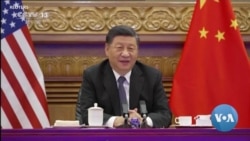ຫຼັງຈາກກອງປະຊຸມ ລະຫວ່າງປະທານາທິບໍດີແລະປະທານປະເທດຂອງພວກເຂົາເຈົ້າ ໃນວັນຈັນທີ່ຜ່ານມານີ້ແລ້ວ ສະຫະລັດແລະຈີນ ໄດ້ຕົກລົງ ທີ່ຈະສືບຕໍ່ການສົນທະນາໂອ້ລົມກັນໃນເລື້ອງການຄຸ້ມຄອງ “ຍຸດທະສາດເພື່ອໃຫ້ມີສະຖຽນລະພາບ” ທີ່ກ່ຽວຂ້ອງກັບບັນຫາເຊັ່ນວ່າ ໄຕ້ຫວັນ ການຄວບຄຸມອາວຸດນິວເຄລຍ ແລະຄວາມປອດໄພທາງດ້ານໄຊເບີ. ແຕ່ໃນຂະນະທີ່ຫົວໜ້າພະແນກຂ່າວປະຈຳທຳນຽບຂາວ ແພດຊີ ວີດາຄຸສວາຣາ ລາຍງານມາ ກໍແມ່ນວ່າ ລັກສະນະຂອງການໂຕ້ຖຽງ ໂດຍພື້ນຖານແລ້ວ ໃນສາຍສຳພັນ ລະຫວ່າງສະຫະລັດກັບຈີນ ບໍ່ມີທ່າທີວ່າ ຈະມີການປ່ຽນແປງເລີຍ ຊຶ່ງໄຊຈະເລີນສຸກ ຈະນຳລາຍລະອຽດ ມາສະເໜີທ່ານ ໃນອັນດັບຕໍ່ໄປ.
ສາຍສຳພັນລະຫວ່າງສະຫະລັດແລະຈີນ ແມ່ນເຕັມໄປດ້ວຍຄວາມແຕກຕ່າງກັນ.
ແຕ່ມີສິ່ງນຶ່ງທີ່ຜູ້ນຳທັງສອງຂອງພວກເຂົາເຈົ້າ ເຫັນດີນຳກັນ ຄື ທັງສອງຝ່າຍຕ້ອງສືບຕໍ່ລົມກັນ.
ປະທານາທິບໍດີ ໂຈ ໄບເດັນ ເວົ້າວ່າ “ຄວາມຮັບຜິດຊອບຂອງພວກເຮົາ ໃນຖານະເປັນຜູ້ນຳຂອງຈີນ ແລະຂອງສະຫະລັດ ແມ່ນຮັບປະກັນວ່າ ການແຂ່ງ ຂັນລະຫວ່າງປະເທດຂອງພວກເຮົາ ບໍ່ປ່ຽນທິດທາງໄປສູ່ບັນຫາຂັດແຍ້ງ ບໍ່ວ່າຈະດ້ວຍຄວາມຕັ້ງໃຈຫຼືບໍ່ຕັ້ງໃຈ ກໍຕາມ. ຕ້ອງເປັນການແຂ່ງຂັນທີ່ງ່າຍແລະກົງໄປກົງມາ.”
ທ່ານສີ ຈິ້ນຜິງ ປະທານປະເທດຂອງຈີນ ກ່າວເປັນພາສາຈີນວ່າ “ຈີນແລະສະຫະລັດ ຕ້ອງເພີ້ມການຕິດຕໍ່ສື່ສານກັນ ແລະຮ່ວມໄມ້ຮ່ວມມືກັນ, ຕ່າງຝ່າຍກຳກັບນຳກິດຈະການພາຍໃນຂອງເຂົາເຈົ້າ ໃຫ້ດີ ແລະໃນເວລາດຽວກັນ ແບກຫາບຄວາມຮັບຜິດຊອບຕ່າງໆຕໍ່ນານາຊາດຮ່ວມກັນ.”
ໃນຂະນະທີ່ນ້ຳສຽງຂອງການປະຊຸມທາງໄກຫຼືທາງອອນໄລນ໌ ໃນວັນຈັນຜ່ານມາ ລະຫວ່າງປະທານາທິບໍດີ ໂຈ ໄບເດັນ ແລະປະທານປະເທດຈີນ ທ່ານສີ ຈິ້ນຜິງ ແມ່ນເປັນໄປດ້ວຍຄວາມນັບຖື ຊຶ່ງບັນດານັກວິເຄາະກ່າວວ່າ ມັນກໍບໍ່ໄດ້ປ່ຽນແປງສະພາບການທີ່ຂັດແຍ້ງກັນໂດຍພື້ນຖານ ທີ່ມີຢູ່ແລ້ວໃນສາຍສຳພັນນັ້ນ.
ທ່ານໂຣເບີດ ແດລີ ຜູ້ອຳນວຍການ ສະຖາບັນຄິສສິງເຈີຂອງສູນກາງວີລສັນ ກ່າວຜ່ານທາງສະໄກປ໌ ວ່າ “ກອງປະຊຸມສຸດຍອດ ແມ່ນຄືກັນກັບຄູ່ຜົວເມຍທີ່ກຳລັງເຂົ້າຮັບການປຶກສາເພື່ອແກ້ໄຂບັນຫາ, ຊຶ່ງແຕ່ລະຝ່າຍນັ້ນກໍບໍ່ໄດ້ພະຍາ ຍາມທີ່ຈະແກ້ໄຂ ຫຼືປ່ຽນແປງເລື້ອງຊີວິດສົມລົດຢ່າງຈິງຈັງ ຫາກແຕ່ລະຝ່າຍ ພະຍາຍາມຊັກຈູງທີ່ປຶກສາເພື່ອໃຫ້ເຂົ້າຂ້າງຝ່າຍຂອງຕົນ ແລະເພື່ອທີ່ຈະທັບ ຖົມຕໍ່ຕ້ານອີກຝ່າຍນຶ່ງ.”
ເລື້ອງລໍ່ແຫຼມທີ່ສຸດໃນສາຍສຳພັນທີ່ມີບັນຫາຢູ່ນີ້ ແມ່ນໄຕ້ຫວັນ. ທ່ານໄບເດັນ ໄດ້ກ່າວວ່າ ສະຫະລັດຍັງຄົງໝັ້ນໝາຍຕໍ່ນະໂຍບາຍ “ຈີນດຽວ ຫຼື One China” ແຕ່ຄັດຄ້ານຢ່າງແຂງຂັນຕໍ່ຄວາມພະຍາຍາມພຽງຝ່າຍດຽວເພື່ອປ່ຽນສະຖານະພາບໃນປັດຈຸບັນຂອງເກາະດັ່ງກ່າວ ຊຶ່ງໃນເວລານີ້ເປັນອົງການປົກຄອງທີ່ແຍກອອກຈາກຈີນແຜ່ນດິນໃຫຍ່. ໃນການກ່າວຖະແຫລງຢູ່ທີ່ງານລ້ຽງຂອງສະຖາບັນ ບຣຸກກິງສ໌ ຫຼື Brookings Institution ຂອງທ່ານເຈກ ຊູລລີວັນ ທີ່ປຶກສາດ້ານຄວາມໝັ້ນຄົງແຫ່ງຊາດ.
ທ່ານເຈກ ຊູລລີວັນ ເວົ້າວ່າ “ຮັບ ປະກັນສັນຕິພາບ ແລະສະຖຽນລະພາບ ຂ້າມຊ່ອງແຄບໄຕ້ຫວັນ, ການຕິດຕໍ່ສື່ສານຢ່າງຈະແຈ້ງ, ຫຼີກເວັ້ນການຕິດຕໍ່ສື່ສານທີ່ຜິດພາດ ຈະເປັນສິ່ງທີ່ສຳຄັນ ແລະໃນດ້ານວຽກງານທີ່ເຂັ້ມງວດລະຫວ່າງກອງທັບຂອງພວກເຮົາ, ລະຫວ່າງສະພາຄວາມໝັ້ນຄົງແຫ່ງຊາດຂອງພວກເຮົາ ແລະລະຫວ່າງບັນດານັກການທູດຂອງພວກເຮົາ.”
ຫຼັງຈາກກອງປະຊຸມສຸດຍອດສິ້ນສຸດລົງ ກະຊວງການຕ່າງປະເທດຂອງຈີນ ໄດ້ກ່າວເຕືອນພວກໄຕ້ຫວັນແບ່ງແຍກດິນແດນ ວ່າ ຢ່າຍຸແຍ່ປັກກິ່ງ.
ທ່ານສາວ ລີຈຽນ ໂຄສົກກະຊວງການຕ່າງປະເທດ ກ່າວເປັນພາສາຈີນວ່າ “ຕໍ່ບັນຫາຕ່າງໆກ່ຽວກັບອະທິປະໄຕຂອງຈີນ ແລະຜືນແຜ່ນດິນອັນຄົບຖ້ວນ, ຈີນບໍ່ມີຊ່ອງຫວ່າງໃດໆສຳລັບການປະນີປະນອມ.”
ທ່ານໄບເດັນ ແລະທ່ານສີ ຕົກລົງທີ່ຈະຈັດຕັ້ງ ຍຸດທະສາດໃນການສົນທະນາ ດ້ານຄວາມໝັ້ນຄົງ ຕໍ່ເລື້ອງທີ່ລໍ່ແຫຼມອື່ນໆ ເຊັ່ນວ່າ ສັກກະຍະພາບດ້ານການທະຫານ ການຄວບຄຸມອາວຸດນິວເຄລຍ ແລະດ້ານຄວາມປອດໄພທາງໄຊເບີ. ທັງສອງຝ່າຍມີຄວາມສົນໃຈທີ່ຈະຮັກສາສາຍສຳພັນໃຫ້ທຸ່ນທ່ຽງ ຊຶ່ງສະຫະລັດ ຈະຈັດການເລືອກຕັ້ງກາງສະໄໝ ໃນປີ 2022 ໃນຂະນະດຽວກັນ ທ່ານສີ ແລະພັກຄອມມິວນິສຂອງຈີນ ຍັງມີງານທີ່ສຳຄັນຕ່າງໆຂ້າງໜ້ານີ້.
ທ່ານນາງບອນນີ ລິນ ຜູ້ອຳນວຍການ CSIS China Power Project ກ່າວຜ່ານທາງສະໄກປ໌ ວ່າ “ທ່ານສີ ຕ້ອງການສື່ສານດ້ານຄວາມໝັ້ນຄົງ ທ່ານສີຕ້ອງການສະພາບແວດລ້ອມຂອງນານາຊາດທີ່ທຸ່ນທ່ຽງເພື່ອຮັບປະກັນວ່າ ການແຂ່ງຂັນກິລາໂອລິມປິກ ຈະໄປໄດ້ດີ, ພ້ອມກັນນັ້ນ ກອງປະຊຸມຄະນະສະມາຊິກສະພາ ຄັ້ງທີ 20 ຈະໄປໄດ້ດີ.”
ຈີນຄາດໝາຍວ່າ ຈະສືບຕໍ່ກິດຈະກຳຕ່າງໆດ້ານການທະຫານຂອງຕົນຕໍ່ໄປ ໃນເຂດປາຊີຟິກກ້ຳຕາເວັນຕົກ ຊຶ່ງວໍຊິງຕັນ ມອງເຫັນວ່າ ເປັນການເກາະຜິດ. ໃນຂະນະດຽວກັນ ປັກກິ່ງ ກໍຈະກະກຽມສຳລັບກອງປະຊຸມສຸດຍອດເພື່ອປະຊາທິປະໄຕ ທີ່ກຳລັງຈະມາເຖິງນີ້ ຊຶ່ງຈັດຂຶ້ນໂດຍທ່ານໄບເດັນ ໃນເດືອນທັນວາ.
ທ່ານໂຣເບີດ ແດລີ ຢູ່ສູນກາງວີລສັນ ກ່າວວ່າ “ອັນນັ້ນ ບໍ່ພຽງແຕ່ກ່ຽວກັບຈີນເທົ່ານັ້ນ ແນ່ນອນ ມັນຍັງກ່ຽວກັບລັດທິຜະເດັດການທີ່ກຳລັງມີຫຼາຍຂຶ້ນເລື້ອຍໆໃນຢູໂຣບ ແຕ່ມັນຈະເປັນປະສົບການທີ່ຈີນ ຈະໄດ້ຮູ້ສຶກດັ່ງກັບສ້ຽນໜາມຢູ່ຂ້າງຂອງຕົນ. ແລະລັດຖະບານທ່ານໄບເດັນຍັງຈະປະກາດໃນໄວໆນີ້ ຍຸດທະສາດ ໃໝ່ໃນເຂດອິນໂດ-ປາຊີຟິກ ຊຶ່ງຈະເປັນຈຸດສູນກາງສຳຄັນຂອງຈີນ ແລະຕົນຈະເສັດສິ້ນການທົບທວນຄືນ ນະໂຍບາຍຕ່າງໆຕໍ່ຈີນຂອງຕົນ.”
ມີພື້ນທີ່ໃດແນ່ ທີ່ອາດເປັນໄປໄດ້ຂອງການຮ່ວມໄມ້ຮ່ວມມືກັນລະຫວ່າງສະຫະລັດແລະຈີນ? ການເຮັດວຽກຮ່ວມກັນເພື່ອຫລຸດຜ່ອນການປ່ອຍຄວັນພິດ ແລະຮ່ວມກັນຮັບມືກັບວິກິດການດ້ານສະພາບອາກາດ ແລະສິ້ນສຸດໂຣກລະບາດຂອງພະຍາດໂຄວິດ-19 ໃນທົ່ວໂລກ ໃຫ້ໄວກວ່ານີ້.
After the meeting between their presidents Monday, the U.S. and China agreed to continue dialogue on managing “strategic stability” on issues such as Taiwan, nuclear arms control and cybersecurity. But as White House Bureau Chief Patsy Widakuswara reports, the fundamentally contentious nature of the U.S.-China relationship is unlikely to change.
The U.S.-China relationship is rife with differences.
But there is one thing their leaders agree on — the two sides need to continue talking.
(President Joe Biden)
“Our responsibility as leaders of China and the United States is to ensure that the competition between our countries does not veer into conflict, whether intended or unintended. Just simple, straightforward competition."
(Xi Jinping, Chinese President) (Mandarin, need English VO)
“China and the U.S. need to increase communication and cooperation, each run their domestic affairs well and, at the same time, shoulder their share of international responsibilities.”
While the tone of the Monday virtual meeting between President Joe Biden and Chinese President Xi Jinping was cordial, analysts say it does not change the fundamentally contentious nature of the relationship.
(Robert Daly, Wilson Center) (Skype)
“((The summit)) was like a married couple going to therapy, in which neither is really trying to fix or change the marriage, but each instead is trying to convince the counselor to take his or her side and to gang up against the other.”
The most sensitive issue in this troubled relationship is Taiwan. Biden said the U.S. remains committed to the "One China" policy but strongly opposes unilateral efforts to change the status quo of the island that is now a separate governing entity from mainland China. Speaking at a Brookings Institution event, national security adviser Jake Sullivan.
(Jake Sullivan, National Security Adviser) (Courtesy Brookings Institution and YouTube)
“Ensuring peace and stability across the Taiwan Strait, having clear communication, avoiding miscommunication is going to be an important and intensive aspect of work between our militaries, between our National Security Councils and between our diplomats.
Following the summit, China's Foreign Ministry warned Taiwan secessionists not to provoke Beijing.
(Zhao Lijian, Chinese Foreign Ministry Spokesperson) (Mandarin need male English VO)
"On issues concerning China’s sovereignty and territorial integrity, China does not have any room for compromise."
Biden and Xi agreed to establish a strategic stability dialogue on other sensitive issues such as military capability, nuclear arms control and cybersecurity. Both sides have an interest in keeping the relationship stable — the U.S. will hold midterm elections in 2022, while Xi and the Chinese Communist Party also have important events ahead.
(Bonny Lin, CSIS China Power Project Director) (Skype)
“Xi wants to message stability. Xi wants a relatively stable international environment to make sure that the Olympics goes well, as well as the 20th Party Congress goes well.”
China is expected to continue its military activities in the Western Pacific, which Washington views as provocation. Meanwhile, Beijing will be bracing for the upcoming Summit for Democracy hosted by Biden in December.
(Robert Daly, Wilson Center) (Skype)
“That is not only about China, of course, it's also about growing authoritarianism in Europe, but it will be experienced by China as a thorn in its side. And the Biden administration will also be announcing soon its new Indo-Pacific strategy, which will be China-centric, and it will be completing its review of China policies.”
Possible areas of cooperation between U.S. and China? Working together to reduce emissions and tackle the climate crisis, and to end the global COVID-19 pandemic sooner.





